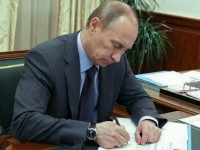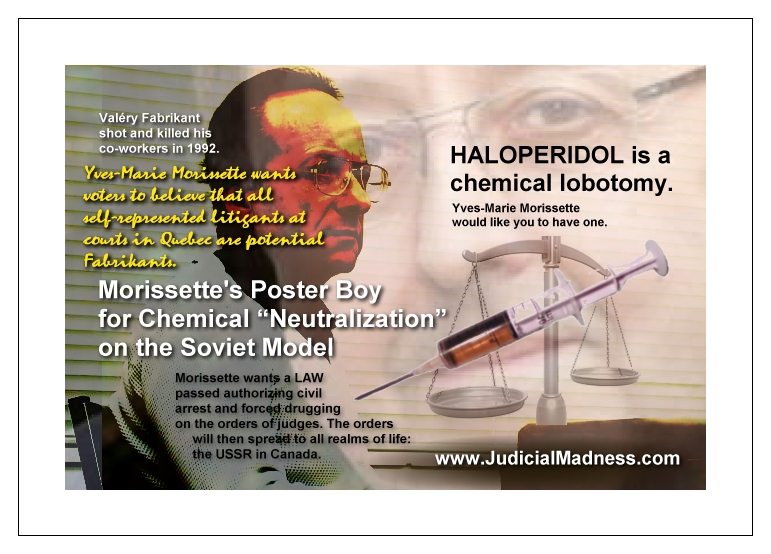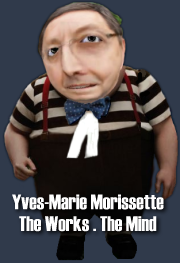Soviet Forever by Alexander Podrabinek
Foreword: Former Soviet dissident, Alexander Podrabinek, describes the calculated revival of the Soviet Union by the Putin regime.
Published on the 10th of April 2013 by the IMR Institute of Modern Russia in its Analysis category, this article confirms with numerous new and crucial details, the assertions by former Soviet dissident Vladimir Bukovsky in his own public Distinguished Lecture of Tuesday, October 13, 2009 for the Cato Institute under the title: The Power of Memory and Acknowledgement, namely that Old KGB-ers are Reviving the Soviet System.
In 1995, in his book The Perestroika Deception, edited by noted Soviet analyst the late Christopher Story, Anatoliy Golitsyn, a highly trained Soviet intelligence officer who defected to the West in December 1961, warns of the ploy of The Long-Term Strategy. Golitsyn urges the West to avoid its own restructuring toward a new, world-wide “October Revolution” ['Weltoktober']*
“It was during 1958-60 that the Communist leaders envisaged the convergence of restructured and transformed capitalist systems leading ultimately to one system of World Government.”
– Anatoliy Golitsyn, The Perestroika Deception, p. 12.
“It [the new method] sees it, not only as a renewal of Soviet society, but as a global strategic design for ‘restructuring’ the entire capitalist world.”
– Anatoliy Golitsyn, The Perestroika Deception, p. 17.
“A system which has murdered 20 million of its own people (50 million, if the loss of life in China under Communism is included), which has raped its intellectuals, and which has brought suffering and misery to the peoples of the Soviet Empire, does not deserve to be renewed. The American people are under no moral obligation to help with the resurrection of such a plainly evil system. The pragmatic basis for a revised US response to ‘perestroika’ is the need to protect and preserve the American system from ‘restructuring’ preparatory to ‘convergence’ with the ‘reformed’ Soviet system, and to save the American people from the blood baths and re-education camps which such ‘convergence’ will eventually bring about, of which the West currently has no conception.”
– Anatoliy Golitsyn, “Postscript: The Long-Range Deception Strategy”, p. 209 in The Perestroika Deception, 1995.
These two pieces together – by Bukovsky and by Podrabinek are sufficient proof that the old Soviet Union is in a process of restoration. How ironic that neither dissident appears to be aware of the well formed warnings of Anatoliy Golitsyn. Perhaps because Golitsyn defected to America, and exposed his knowledge to the West, rather than to his ex-fellow Russians. Russia deserves to discover Anatoliy Golitsyn; now, more than ever.
Bold highlights in the article below have been added by the present borrower of this urgent material.
Soviet Forever
Preamble
The Russian authorities’ efforts to bring back Soviet-era symbols are a sure indicator of their determination to return to Soviet repressive practices. Author and analyst Alexander Podrabinek emphasizes that Russian society still has time to stop and reverse this trend.
Alexander Podrabinek:
It is a pity that our government is so predictable when left to its own resources. When nobody pulls it up, when it is not prevented from acting on its own, when nobody has it by the hand or, better still, by the throat, then the path it will take is evident. Its ideal vision of the world is an omnipotent government and an impotent people. This ideal has lately been hard to achieve, but the government still passionately aspires to it.
In different periods of Russian history, the government has offered diverse reasons for isolating itself from society: at one time, it claimed that absolutism was necessary to keep the country safe from the enemies surrounding it; at another time, absolutism was dictated by the need to preserve the sanctity of the Lord’s Anointed; at another still, the government argued that it alone possessed the superior knowledge of how to build a happy future, or some other silliness. Sometimes people believed these scoundrels; sometimes they strongly opposed them; but most often, they simply resigned themselves to reality.
For the last ten years, there has not been anyone to pull the Russian government up sharp. It is time to take the regime by the throat, but who will do that now? That is why the government is slowly gravitating toward the most recent example of its ideal. And what is our history’s most recent example of a strong government and a weak society? The Soviet Union, of course!
Many thought that the choice of the Stalinist anthem was a whim that should not be taken seriously. State symbols, however, are not chosen incidentally.
Boris Yeltsin’s post-Soviet Russia tried to get away from Soviet captivity. This effort did not work out well, because it was led by ex-communists, who had been brought up by the Soviet regime and had successfully absorbed the poison of the Soviet way of life. Vladimir Putin’s Russia, which has gravitated toward Soviet standards in all spheres of life, has given up trying to get away from the Soviet past altogether. Of course, when one says “Putin’s Russia,” one means Putin’s regime. Russia itself is much bigger, more diverse, and more decent.
This regime felt embarrassed by the rehabilitation of Stalin, but it restored the melody of Stalin’s national anthem, which has been cursed over and over again by both the Russian people and history. Putin revived this song in the first year of his presidency, and on January 1, 2001 the Russian people heard it once again as their official anthem. It was a clear indicator of the regime’s new course. Many thought at the time that the choice of music was a whim that should not be taken seriously. State symbols, however, are not chosen incidentally. Solutions to real problems can be dictated by different motives, but the choice of a symbol always has one reason – to express devotion to a political ideal.
After Putin’s return to the Kremlin in 2012, the restoration of “Soviet values” got a second wind. It was a sort of response by the illegitimate government to the mass public resentment of the Medvedev-Putin job swap in September 2011 and the fraudulent parliamentary and presidential elections that followed.
The regime’s pragmatic legislative decisions have led many of those who used to be skeptical about the threat of a Soviet restoration to talk about the possibility of a return to the USSR. It has become rather evident that legislation, let alone law enforcement practices, is going back to Soviet standards. Politically motivated trials on far-fetched grounds with outrageous sentences have lost their exotic character and have become an everyday occurrence. There has even been talk about a return to 1937 (the year of Stalin’s Great Purge), which today seems like an overstatement. The fact that people are surprised to see a sudden comeback of the Soviet model of repression after having for several years ignored the clear signs that the regime was giving them by restoring Soviet symbols could be funny, if it were not so sad.

In 2000, Vladimir Putin signed the law reinstating the melody of Stalin’s national anthem. Russia’s leading cultural figures issued a statement warning the president that “millions of our fellow citizens…will never respect an anthem that…insults the memory of the victims of Soviet political repression.
There might be a close connection between these symbols and the government’s plans: the more stupid the Soviet symbols that are being brought back, the stronger the government’s intention to drown the country in a Soviet sinkhole. Stupidity and cruelty often go hand in hand.
Putin’s recent proposals make it clear that his intentions are rather serious. Even if the idea of reintroducing school uniforms can be explained – with great reserve – by the intention of easing religious and social tensions, the restoration of the Ready for Labor and Defense program and the Soviet-era Hero of Labor title can be seen as nothing but purely symbolic moves. And these moves make it clear that stupid Soviet symbols will be accompanied by tough Soviet practices.
Many, however, still find no reason to be worried. Some try to convince themselves that the return to Soviet symbolism is just a byproduct of people’s nostalgia for their youth, when everything was better by definition, and which happened to occur for many during the Soviet period. Others soothe themselves by seeing the restoration of Soviet symbols as a nostalgia for Soviet aesthetics. All these are nice explanations, but the government’s moves remind one more of the behavior of a predator when it marks its territory – only here the marking deals not with a geographical territory, but with a mental one. The government is using signs of its past Soviet greatness to plunge those who still remember those times into a permanent state of Soviet stupor, social inertia, and slavish submission. It is trying to recreate the climate of fear in which all nations in the USSR lived. The regime hopes to use Soviet measures to once again successfully enslave the country.
Of course, the USSR only remains an unquestionable icon for intellectually deficient communists. The current regime wants to borrow from the Soviet Union the most effective ways (or what it calls “the best achievements”) to keep society in a state of fear and humility. The government will not be squeamish about using what it finds to be the most effective practices of Czarist Russia, either. Nor will it reject the methods of governance used in other totalitarian countries if it can manage to transfer those methods to Russia. The current leaders are not dogmatic people; they will use anything that comes in handy to attain their desired ends.
They will not take from Czarist Russia the judicial or land reforms of Alexander II, but they will avidly snatch up the revival of the Cossack movement, the idea that Russia has a special path, and the belief that the Orthodox Church should be tightly bolted to the throne. They will also readily draw on the experiences of modern-day totalitarian regimes. They will gladly copy China’s efforts in limiting free use of the Internet. The government already closely studies China’s economic model, which it believes in the long term could help it realize its dream of ruling like Stalin and living like Abramovich.1
The current regime wants to borrow from the Soviet Union the most effective ways (or what it calls “the best achievements”) to keep society in a state of fear.
As has already been noted, the leaders of today’s Russia are not dogmatic people who want to bring back to life the corpse of socialism no matter the cost. They just want to restore the conditions that would secure their position and provide them with a guarantee that they could not be removed – preferably without much of a sacrifice, but if things do not work out this way, they are ready to make big ones. They are looking for an example to follow, for approved ways to manage society, which they successfully find in our recent past. They understand, however, that they cannot go far with such a load. The future does not allow us to simply copy the past. That is why they so often and so cautiously talk about modernization, innovations, new objectives, and conformity with the times. On the face of it, these notions sharply contradict their retrograde practices, but in reality, there are no contradictions here. They are trying to adapt Soviet totalitarianism to the twenty-first century. They are looking for ways to achieve this end. Their task is difficult, and we have plenty of opportunities to prevent them from fulfilling it.
Every national society has its own merits and drawbacks. The Russian people’s serious drawback consists in its lack of thoroughness in work and indifference to details. This drawback is easily explained by the “happy-go-lucky” mentality. In some spheres – for example, in politics and in medicine – this outlook can prove catastrophic. By failing to see the symptoms of an approaching sickness, we condemn ourselves to the necessity to confront evil on a large scale instead of nipping it in the bud. Consequently, we often lose such fights. We are always late, when it is no use crying over spilt milk anymore. National traits, however, are neither fatal nor everlasting. Our destiny is in our hands. We should just pay more attention to things that at first glance appear unimportant.
_____
* On the topic of western restructuring, see my exclusive French transcript and English translation called “René Lévesque’s Communist ‘Compromise’ – Fundamental Restructuring of all of Canada” at https://nosnowinmoscow.wordpress.com. Ed. Judicial Madness.
1 Roman Abramovich, an “oligarch” with close ties to the Kremlin, is one of Russia’s richest men.




